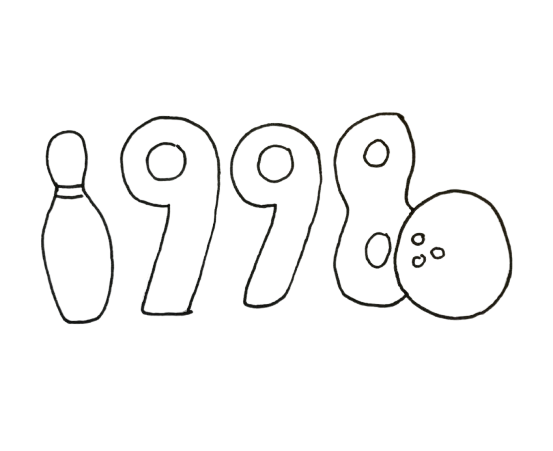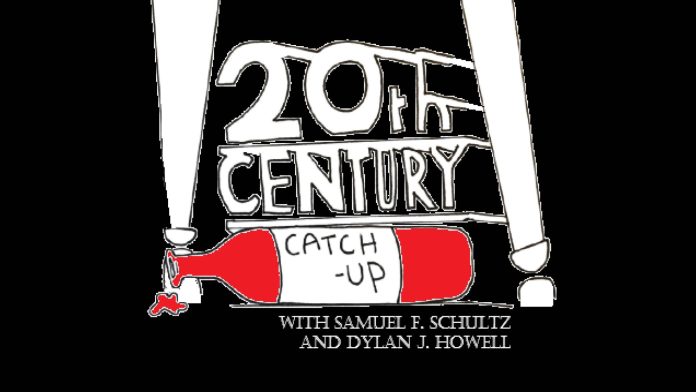Co-written by Samuel F. Schultz and Dylan J. Howell
How many movies are in your streaming queue? How many “classics” sit unwatched on your shelf? It’s literally impossible to watch every movie ever made, so which are even worth your time?
Dylan and I have “to watch” lists a proverbial mile long, and we decided it’s high time we do something about it: sit on our collective asses and melt into the couch. We’ll be doing our damnedest to catch up on the hundreds of movies we missed from the century before we were born, watching one movie a week representing each year from Taft to Y2K and posting reviews on the Rambler’s website.
We also have side missions: One Bond movie a month and a special Relished Films category to pick familiar favorites outside of the chronology. New movies that interest us may also be added to the mix, helping us stay “hip” to the “current scene.” Expect reviews of Catch-Up films and Bond movies regularly, but don’t hold your breath waiting for the others.
Butter that popcorn and pull up a chair as we step out of the Matrix and take A Trip to the Moon.

Catch Up Film 0: The Big Lebowski (1998)
Viewed:
As part of the Kentucky Theatre’s Summer Classics series on Wednesday, September 4th
Where to watch:
Free with Amazon Prime or rent from Apple TV
Motion Picture Association rating: R
Pervasive strong language, drug content, sexuality, brief violence
Overview (Sam)
Where better to start than the end? At the outset of our foray into twentieth-century film, The Big Lebowski (1998) acts both as an extended allusion to the classic noir/crime film The Big Sleep (1946) and a perfect reflection on the end of the twentieth century. Set in a reconstructed 1991 Los Angeles, with the Gulf War as an allegorical backdrop, Jeffrey Lebowski, known as The Dude, is a man perfect for his time. In a decade of seeming moral relativism, everyone is prescribed an ethos except for The Dude, whose particularism clashes with the stark generalism of many around him. After his rug is micturated upon by an intruder in a case of mistaken identity, The Dude is plunged into the quagmire of an ever-more-complicated kidnapping plot as he gets further and further from his original goal: to get his rug back.
(After this week, we are going back to the 1900s. Trust the process.)
Sam’s part:
My favorite aspect of The Big Lebowski is its point of view: throughout the film, we only see things from The Dude’s perspective. As he’s inundated with stances and judgments, The Dude can hardly get a word in edgewise. Only in a moment of post-coital clarity is the veil lifted and we, along with The Dude, are granted some understanding – new shit comes to light. This, of course, is a subversion of the classic noir style where the detective silently stalks through the story gathering information and playing enemies against each other. In The Big Lebowski, The Dude is totally oblivious to most of the goings on around him, yet is still seen by some characters as a talented sleuth.
This idea of mistaken identity is more than one isolated narrative instance. The Dude is not even the titular “Big Lebowski,” but in fact little more than a bum in the grand scheme of the supporting casts’ lives. That is, except for his two best friends, Walter (John Goodman) and Donny (Steve Buscemi), who act as the angels on his shoulders throughout the film. Donny’s role is comically underplayed while Walter, a manic, rule-obsessed veteran, is the driving force behind The Dude’s decision to step out of passive “Duddhism” and try to get his rug back in the first place. Even still, as he is routinely threatened with bodily harm, drugged, and generally derided, The Dude remains passive. He has little to no control over what happens to him, but in the end, he doesn’t really mind. He’s content to simply abide.
If you are philosophically and/or analytically inclined, I highly recommend checking out The Big Lebowski and Philosophy, a collection of essays edited by our very own Dr. Peter S Fosl which can be found in Transylvania University’s library and in many fine book retailers.
Endlessly quotable and visually stunning, The Big Lebowski is a must-watch. This was my third viewing and it gets better every time.
Dylan’s part:
There comes a time once a decade or even once a century in which a film is needed. A film that ties all those years together. Seemingly without trying, The Big Lebowski defines the 90s, if not the 20th century, entirely. That’s partially why we are beginning our venture into cinema over one of the most technologically progressive and culturally diverse centuries in human history with the film. The Big Lebowski shows how much Ethan and Joel Coen make films for themselves more than anyone else. The attention to detail is fascinating in how they can pay attention to seemingly every movement and object within a single frame of their films. The character work is some of the best I’ve seen in film, with John Goodman, who plays Walter, saying it’s his favorite role. Walter’s moment of vulnerability near the end of the film demonstrates the Coen brothers’ exceptional use of repetition. The character of Donnie is one of the most interesting to me. He is ignored for most of the film and only interacts with Walter, besides one scene with The Dude. But The Dude certainly has a place in the canon of popular culture. I would argue this film is an homage to several genres that defined the twentieth century: noir, adventure, buddy-cop, and a few more, all of them blending together to make a film plot that you have to just abide by. It ends by comforting the viewer by showing that no matter who steals your rug, you can always go bowling. – 9.5 bottles of Ketchup



